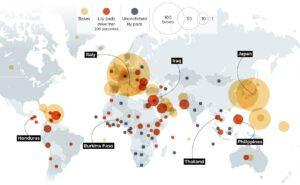Biden’s Plan to Revamp American Imperialism


Some of the U.S. military bases around the world in 2015. Today there are 800.
This article was written for L’Anticapitaliste, the weekly newspaper of the New Anticapitalist Party (NPA) of France.
Joseph Biden has stated that his presidential foreign policy goal is to “place the United States back at the head of the table” in the councils of world affairs. While trying to reestablish ties to European allies, he has already increased tensions with the country’s enemies.
The United States dominated world capitalism from 1945 until 1991, and then with the fall of the Soviet Union, it became the world’s sole superpower, its hegemony based upon foreign investment, its 800 military bases around the world, armed intervention, and actual warfare. By the 2000s, the United States had begun to wane as an imperial power. The 2008 Great Recession was a turning point as the U.S. economy ground to a halt while China’s economy continued to soar. As American power declined, Russia took advantage of the opportunity and seized the Crimea in 2014, the first such imperialist seizure of territory in Europe since World War II.
Today, Biden faces a host of challenges. Trump, arguing that China engaged in money manipulation and unfair competition, took strong measures against the U.S. rival, including tariffs, economic sanctions, and visa restrictions. Biden has kept Trump’s measures in place while in recent bilateral talks held in Anchorage, Alaska, U.S. Secretary of State Anthony Blinken accused China of human rights violations in Hong Kong and Xinjiang, the home province of the Uyghurs. Chinese Communist Party foreign affairs Zhao Lijian in turn accused the United States of having its own human rights issues, a reference to the suppression of the Black Lives Matter protests last year. Zhao said the talks had a “strong smell of gun powder.” The accusations of both governments about the other’s human rights violations are, of course, true, but the mutual recriminations about human rights only serve to cover up the underlying struggle for power.
Biden’s war of words with the Chinese makes it hard for him to get China to pressure North Korea on nuclear arms. And as Kim Yo Jong—sister and aide to dictator Kim Jong Un—recently stated, “We take this opportunity to warn the new U.S. administration trying hard to give off powder smell in our land.”
Relations with Russia are also tense after Biden called dictator Vladimir Putin “a killer.” Putin’s spokesman Dmitry Peskov stated, “These are very bad statements by the President of the United States. He definitely does not want to improve relations with us, and we will continue to proceed from this.” Putin himself said he would like public “open and direct discussions” with Biden. While Biden’s remark was certainly true, it increases the friction between the two countries.
Regarding Iran, Biden would like to return to the 2015 nuclear deal that Trump left in 2018, but Iran is demanding an end to the devastating economic sanctions—stopping the sale of Iranian oil—while it continues to develop its nuclear program. And its surrogate the Houthis in Yemen fire missiles at oil fields in Saudi Arabia. Biden, who fears looking weak, has kept Trump’s sanctions in place, but he will probably have to make concessions to draw Iran into the treaty once again.
Trump promised that the United States would by May 1 withdraw its last 2,500 troops from Afghanistan, where the United States has been at war for almost twenty years. Biden is now demanding that, before the U.S. withdraws, Afghanistan form a new government that includes the Taliban.
We are entering a period that resembles the early twentieth century, when the rival great powers challenged the hegemony of Great Britain, leading to World War I. Today, rival powers challenge the United States, and American socialists face the task of opposing American imperialism while showing internationalist solidarity with struggles for democracy, social reforms, and socialism in countries around the world.